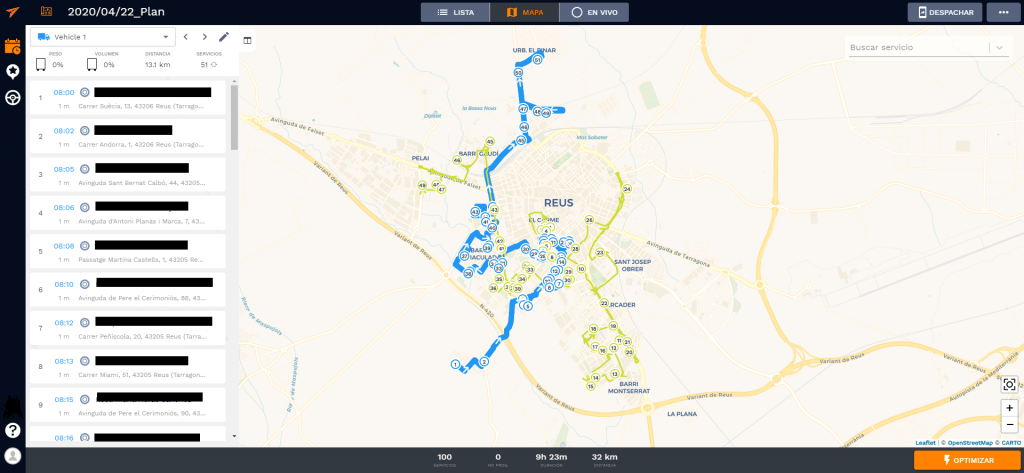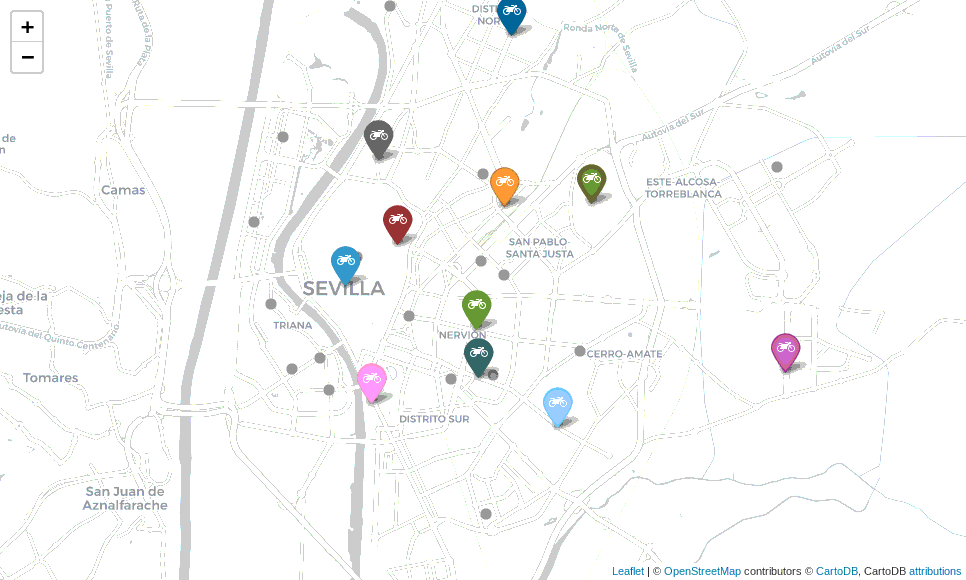Georeferencing

We know how hard your day to day is. Planning routes is a tedious job that requires a lot of concentration and experience. From Routal.com we want to help you, that's why we launched a series of training pills to help you improve day by day. Our goal is for you to plan better, faster and more successfully.
Shall we start?
In this pill, we're going to show you how our new Proof of Delivery feature works. What has been the communication process between the delivery person and the logistics manager of how each of the deliveries is evolving. The information generated in each delivery is super valuable, since it allows us not only to identify when there is a problem, but also, if everything is going as planned.
How does Proof of Delivery work?
We start from the fact that we have already created our schedule and we have shared the route with our delivery person. (If you've arrived here and you don't really know how to do it, I recommend that you take a look at this Video)
The operation is very simple, a service can be marked as performed or not performed. Once the status is marked, we can simply add a comment, the customer's signature or even a photo to illustrate any packaging problem, a non-existent address, or any other unforeseen event that may occur. (We have delivery friends and they have told us very surprising stories... 🤫)

In this video you can see how this new functionality works and the advantages it provides (2 min).
During these first few weeks we have opened this functionality to all our users, but it will soon be limited to our Gorilla license. We are still working to improve and any feedback is welcome!
We hope it was useful and we look forward to seeing you next week with more pills to improve your daily efficiency!

We know how hard your day to day is. Planning routes is a tedious job that requires a lot of concentration and experience. From Routal.com we want to help you, that's why we launched a series of training pills to help you improve day by day. Our goal is for you to plan better, faster and more successfully.
Shall we start?
In this pill we are going to present a new platform that will help you improve the quality of geolocation. It's about being able to set the country of operation. With this, we are helping the georeferencing system to fix the solutions in a more limited environment, thus improving the result.
How do we define our country of operation?

From now on, all the new plans we create will filter geolocation searches based on the country we have defined. In this way, we will achieve greater reliability of the results and we will save time in correcting addresses.
In this video you can see how this new functionality works and the advantages it provides (2 min).
If you're still having a problem with georeferencing your addresses and you missed your previous pill, I recommend that you take a look at it Ep. 3 — Address Geocoding some recommendations come out on how to structure the directions for greater success.
We hope it was useful and we look forward to seeing you next week with more pills to improve your daily efficiency!

Sant Jordi is always a special day, books, roses, queues and people, lots of people. Everyone is out on the street, enjoying a magical day for both children and adults. It is the day of the year when the most books are sold, 7.5% of annual sales In the city of Barcelona.

This year will be special. We'll have to spend it at home, enjoying a good read, our recommendation for these days The Black Swan by Nassim Taleb. This year we will save ourselves the hassle of Las Ramblas and we will have to buy the roses online. Without a doubt, a special year.
We want to take advantage of this important date to see the success of initiatives that, in a normal year, would hardly have achieved such overwhelming success.
One of our customers Santjordiacasa.com is using Highway as a tool to optimize the distribution of roses on such a special date as Sant Jordi.

Thanks to the power of the Highway route planner, they have been able to grow in deliveries and reach customers that would have been impossible for them before.
Like them, hundreds of other customers are entering a world such as home delivery. A channel that had often been completely forgotten. Thanks, or unfortunately, COVID-19 has forced the launch of new marketing channels such as Ecommerce and its own distribution and home delivery.
We are seeing this in our traditional customers, distribution companies to the HORECA channel that are converting to home distributors overnight.
Pastry shops such as Cropics they were able to deliver all the Easter monkeys in record time and have the detail of leaving a monkey at my wife's grandmother's house 😁. These types of details make being able to help small businesses make you proud of the work you do and of seeing how you can help more people around you.

We are in a very difficult time for many companies and families. There is little help to get through this crisis and reaching those people we can help is always a challenge. I encourage you to share our story, the story of our users and customers, companies that are embarking on a new adventure, delivery. Without experience, without processes, but with a desire to fight and face the corona, you are not alone.
We won this together.

The distribution on demand is an industry that is growing at a very high speed. New companies appear every day, especially in the market for food, beverages and deliveries of perishable products. And the competition is wild. Efficiency is a key metric in the “I want it all and I want it now” era and the most critical part is what happens from when a new order is placed until it is delivered.
Today I want to focus on the problem of sending new orders, that is, how to decide which courier service the order should be assigned to when an order enters the system. This is because the dispatch today is not addressed systematically. Optimizing the dispatch system can minimize delivery time and improve customer satisfaction.
The operating paradigm of companies that deliver on demand can be divided into two different types:
- Operations based on a single warehouse are those operations focused on a single tank. This warehouse has several dealers and the programming is done once to obtain an order list; usually grouping orders by area. Amazon Prime is a good example of this paradigm.
- Operations based on multiple warehouses are those operations that rely on choosing the order in one of the multiple warehouses and delivering it to a customer. In this case, the delivery people are scattered around the city, and once a new order arrives, it is assigned through a shipping process to one of the multiple delivery people. Companies such as Uber, Just Eat, Delivero, etc. operate this way.
The problem of dispatching is solved more or less satisfactorily in the first scenario thanks to the possibility of linking together a list of deliveries and considering it as a Traveling Seller Problem (Traveling Salesman Problem) with some pre-clustering restrictions (OK, I know that TSP is an expensive problem, but... come on, it's about Amazon).
On the contrary, in the second scenario, it is not so clear that the problem is being optimally addressed. How can a new incoming order be added to a running scenario? There are tons of variables to consider:
- Can the courier make multiple collections before starting to deliver?
- Can an already assigned order be reassigned to another courier service?
- Do all orders have the same priority? (for example, all orders must be delivered no later than 30 minutes after placing them)
Do orders need to be delivered by a particular vehicle? - ...

Modeling this scenario can be quite challenging, and that's why SmartMonkey has been working on this problem for a while. We call our solution Online Programming Optimization Model (OSOM) (Yes, branding isn't one of our strengths 😅, but phonetically it sounds like “incredible” and that's pretty fun). OSOM can model business restrictions and find a feasible solution to the dispatching problem.
In the simulation below, we have modeled a world where:
- A courier service can be assigned multiple pickups and deliveries at the same time
- and the first next service of each messaging service is fixed and cannot be reassigned in subsequent iterations.
The visualization contains twenty iterations of the world divided into two steps:
1. New incoming services are marked in gray.
2. Services are dynamically assigned to deliverers to optimize overall delivery time.






.png)


